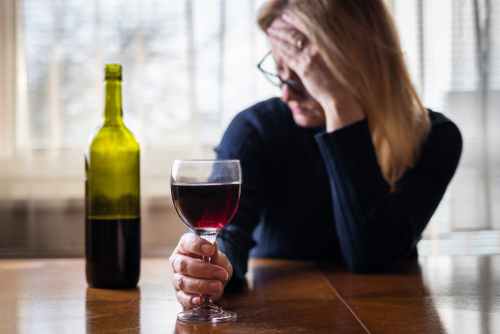The idea of using alcohol as a coping mechanism can slip past most people’s minds, even if they regularly drink alcohol. Drinking after a stressful day at work or school can seem like an easy solution to feeling better, especially watching friends or family members around us or, in the past, doing the same thing. The shot of tequila or vodka, when you’re stressed, depressed, or anxious, can start as a once-a-week occurrence but soon turn into a weekly, then daily dependence.
This short blog discusses signs you’re using alcohol as a coping mechanism, the dangers and long-term effects of alcohol abuse, alternative coping strategies, and the benefits of talking to a professional.

Signs You’re Using Alcohol as a Coping Mechanism
Alcohol abuse and other unhealthy coping skills can replace good habits without us even noticing. They can also fill in for unlearned coping strategies while we are young, quickly becoming the basis for how we make ourselves feel better when we have negative emotions.* But it can be hard to spot the signs you’re using alcohol to cope. These include:
- You want to feel better: Alcohol use disorder is a biopsychosocial condition formed and influenced by biology, psychology, and socio-environmental factors. You might be reaching for the next drink or driving to the liquor store or bar because that’s what your parents or friends do to feel better. Maybe you love going out with friends, and alcohol becomes a frequent source of good times and memories. Responding to negative feelings or stimuli with alcohol is conditioning your body and can lead to alcohol dependence.
- People around you are concerned: Even if you haven’t noticed an unhealthy coping mechanism, someone else probably has. If family, friends, or even co-workers are expressing concern about your alcohol use, it could be a warning sign you’re using it to cope, even when around friends or good company.
- You’re coping in secret: Hiding things and keeping secrets about your drinking is a big warning sign that you’re developing unhealthy drinking habits. Drinking isn’t morally or socially wrong, but it shouldn’t be secretive or a source of comfort. Humans have amazing ways to push through stress, and they don’t have to damage your liver or mental health.
- Your coping mechanism affects everything else: Initially, when you started drinking alcohol to make yourself feel better, it might have seemed okay. But over time, it can start causing problems in different areas of your life, like work, relationships with loved ones, and how you spend your free time. This added stress from your social life may push you to drink more to cope, worsening the situation. This creates a cycle where the problems keep repeating, and drinking isn’t helping.
- You can’t cut down, and your tolerance is increasing: If you’ve recognized an unhealthy drinking habit, you may have tried to quit or cut down at some point. While there are several ways to slowly taper off alcohol, physical or mental withdrawal symptoms indicate your body has formed a dependence.
*It’s okay to have negative emotions, and avoiding them can actually make them feel worse. Research suggests that feeling sad can improve our ability to see reality more clearly in social situations. When we’re sad, we are less likely to deceive ourselves or overlook negative aspects. Surprisingly, sadness can also boost our productivity at work by improving our concentration and making it easier to learn from mistakes. In this way, experiencing failure and negative emotions can eventually lead to future success.
Read more: Things Addicts Say When Confronted & How To Respond

Dangers of Using Alcohol as a Coping Mechanism
Lots of people turn to alcohol to cope because they want to escape from their problems, feel relieved, or take a break. At first, it might seem harmless. But using alcohol to deal with things can work until it doesn’t. Instead of dealing with emotions like anxiety, depression, or shame, alcohol just numbs them temporarily.
In some cases, alcohol can make those negative feelings stronger and worsen conditions like depression. Even if we realize this, it’s easy to return to using alcohol as a quick fix to ease the pain or soothe overwhelming emotions.
Here’s how alcohol can affect your body:
- Brain: Alcohol messes up the brain’s communication system and can change how the brain functions and looks. This can lead to changes in mood and behavior and make it difficult to think clearly and move smoothly.
- Heart: Excessive and prolonged alcohol consumption can harm the heart, leading to issues like cardiomyopathy (stretching and drooping of heart muscle), arrhythmias (irregular heartbeats), stroke, and high blood pressure.
- Liver: Heavy drinking can seriously affect the liver and cause various problems and inflammations, such as fatty liver (steatosis), alcoholic hepatitis, fibrosis, and cirrhosis.
- Pancreas: When you drink alcohol, the ethanol makes the pancreas produce harmful substances that can lead to pancreatitis. Pancreatitis is a dangerous condition where the blood vessels in the pancreas become swollen, causing problems with digestion.
- Cancer: According to the American Cancer Society, 6% of all cancers and 4% of all cancer deaths are caused by alcohol. These include head, neck, mouth, throat, liver, breast, and colorectal cancer.
- Immune System: Drinking too much can make your immune system weaker, making it easier for diseases to attack your body. People who drink heavily are more likely to get illnesses like pneumonia and tuberculosis than those who don’t drink too much. After a heavy drinking session, your body’s ability to fight off infections is actually slowed down for up to 24 hours.
Read more: Can Alcoholics Drink In Moderation? Tips, Cons, & Alternatives
Alternative Coping Strategies
Not all coping mechanisms are unhealthy, and not all are complicated or require much physical effort. A healthy coping mechanism can be as simple as putting on your favorite music when stressed, tuning your ears to something that makes you happy and takes you away from overwhelming feelings. Healthy coping skills aren’t about doing something nice for yourself and waiting for it to make you feel better.
For example, many people can resort to “retail therapy,” buying things online or in-store to make themselves feel better. While giving yourself a gift occasionally is nice, retail therapy reinforces a strong connection between stress and your wallet. You have to mentally dive into your new activity, immerse yourself in what you’re doing, and concentrate on every aspect. Here are some healthy alternative coping strategies to drinking.
- Reach out to friends or family for comfort or support. You can also reach out to friends on social media or messaging platforms.
- Try going walking or swimming before you get into the gym, extreme hikes, or intense sports. No one expects you to drop what you’re doing when you’re stressed to run laps. But walking away from a stressful situation to get some sunlight and fresh air can be the right start.
- Try mindfulness practices like meditation, breathwork, or yoga. It can be hard to “clear your mind,” but mindfulness isn’t about emptying your thoughts. Rather, it’s about filling your body with your own presence.
- You can distract yourself with TV or video games in healthy amounts. Of course, we don’t recommend sinking into the couch when you feel anxious, but a fun and stimulating activity can reset your focus and start you back at a place of comfort.
- Try something creative. Transitioning your focus from negative thoughts in your head to a physical goal in your hands can be a good coping skill. You can also try something you liked to do when you were young. If you like writing, try journaling your feelings. If you enjoy painting, try expressing what you’re feeling on canvas. Coping skills aren’t universal; what works for one person may not work for another.

Benefits of Talking to a Professional
Talking to a professional therapist trained in addiction can help identify the root causes of drinking as a coping mechanism. It can be challenging or scary at first, but a professional can help you do introspective work, highlighting and addressing topics that make you feel vulnerable or insecure. While it doesn’t define us, trauma can also heavily impact how we self-medicate.
Initially, it’ll be hard to transition out of alcohol addiction and find healthier coping skills. But the healing and recovery process is well worth it, and there are people dedicated to helping you.
Alcohol Use Disorder Treatment In Boston
If you or someone you know is using alcohol as a coping mechanism and is struggling to quit or cut down, contact East Coast Recovery Center in Boston, Massachusetts. Our addiction treatment center is the perfect place to explore coping strategies, identify skills that actually help, and heal your mental health without the dangers of alcohol abuse. We treat all our clients as individuals, and our treatment programs and therapy methods are tailored to your needs and goals. Don’t wait. Call today, and one of our admissions agents can help you get started.











